#zupančič
Text


alenka zupančič
14 notes
·
View notes
Text




Some wonderful books I've enjoyed reading lately.
5 notes
·
View notes
Text




aspekti
#i havent done gifs in years in literal years#but i had to. for these weird little guys. and propaganda#i needed to exorcise them from my mind#mrfy#mrfy propaganda#gregor štrasbergar#rok klobučar#lenart merlin#tomaž zupančič#im still in shadow realm of tumblr so this was literally only for my enjoyment
2 notes
·
View notes
Quote
God is dead. And, as a matter of fact, I don’t feel too well either.
Alenka Zupančič, quoted by Graham Harman in Architecture and Objects: Art After Nature (2022)
#philosophy#existentialism#nietzsche#god is dead#alenka zupančič#graham harman#ooo#speculative realism
5 notes
·
View notes
Text
Gorenak: Servilnost in predvolilni nateg SD
Bolni se zvečer postavijo v vrsto, da bi naslednje jutro v Ljubljani prišli do zdravnika. Česa takega ni bilo niti v času globokega socializma.
Vinko Gorenak Foto: DZ
Prvi dnevi novega leta 2023 so politično gledano, tako ali drugače pričakovani, toda prišli so morda prej, kot je bilo pričakovati po aprilskih volitvah v Državni zbor leta 2022. Vsakokratna oblast se po svoje trudi, da bi bila na tak ali drugačen način všečna ljudem, konec koncev ljudje so tisti, ki jo postavijo ali odslovijo. Pri tem popolnoma zanemarjam neverjeten vpliv…

View On WordPress
0 notes
Text
[ENG translation] Joker Out singer opens up about kissing on set and other details of the new film
Interview with Bojan Cvjetićanin and Katja Predan. Original article was written by Sonja Javornik for Novice Svet24, published on 6.1.2024. English translation by @varianestoroff, proof read by TWT klámstrákur.
The new Slovenian film 'Kaj pa Ester?' is targeted primarily at teenage audiences, but Tosja Flaker Bercet's fun, relaxed film will also appeal to older audiences. And it looks like the film will be a hit not only in Slovenia, but also abroad, as fans of Joker Out from all over Europe are waiting for the film to come to their cinemas - the male protagonist is played by the much-loved Bojan Cvjetićanin.
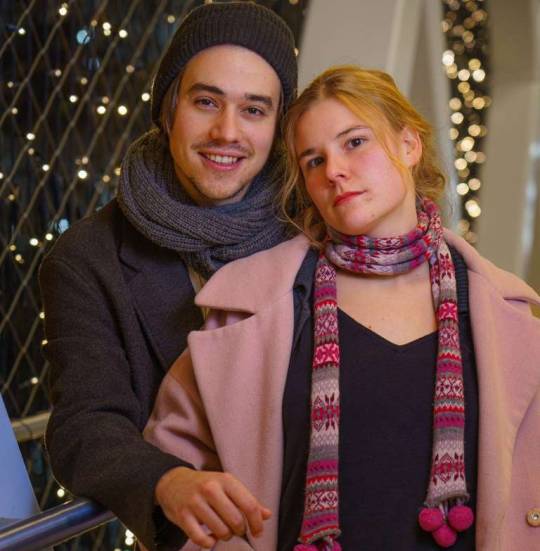
Bojan Cvjetićanin and Katja Predan are the leading actors of the new teen movie 'Kaj pa Ester?' (Photo by Šimen Zupančič)
In 2021, after a long search for the main character, the director invited Bojan Cvjetićanin, the lead singer of a band that was on the verge of success at the time, to audition. Today, Bojan would not have had time to record due to concerts in Europe and other projects (their new album and concert film 'Live From Arena Stožice' is available on www.jokeroutband.com), but back then, it was not a problem for him, so we can admire him in the film alongside the excellent Katja Predan and other young co-stars.
The film is about Ester, who is not pleased when she discovers that her ex-boyfriend, who wants to rebuild their romance, has enrolled at the same high school. Kaj (played by Bojan) tries to show his love for her with romantic gestures, but his moves impress his classmates more than Ester. Ester finds herself in a difficult situation, as her classmates are mean to her because they think she should give Kaj a second chance, but instead she agrees with a friend to act like a lesbian couple... The Ljubljana premiere of the film took place at Cinemaplexx and the whole crew came to see it. Before that, we had the exclusive opportunity to talk to the two main actors. Bojan was five minutes late, but given his frenetic schedule and mild cold, we didn't blame him. Over tea, he and Katja were happy to look back on the filming and joked around, jumping into each other and generally getting on well.
Katja, you are 24 years old and finishing your third year of film directing studies at AGRFT¹.
I'm still one exam away...
So you prefer to be behind the camera than in front of it?
Actually, it was good in front of the camera too. (smiles)
How did you get this role?
That's a good story! I was waiting for a friend who was half an hour late for a drink. But I was sitting at another table, with a friend from high school, when Tosja joined us. He introduced himself, and I told him I knew him. He told me they needed another actress because they were filming something and offered me to come and try it out. I wasn't interested at first, but then I thought that it must be a short film and it wasn't that big of a commitment. When I arrived, I found out that I was auditioning for the main role!
Do you have previous acting experience?
I was in a theatre group, I acted in a play, and then I started directing. That was in the first year of high school. In college I acted in our rehearsals when we were filming, but now I hope to get another chance.

In the interview, Bojan and Katja also revealed - he had his first crush in kindergarten, she had her first boyfriend in high school. (Photo by Šimen Zupančič)
What kind of projects do you want to do as a director?
The ones where people talk a lot (laughs). I'm interested in love themes and situations where nothing special happens and the relationship gets boring.
What was it like working with Bojan?
We've worked together very little because we split up in the film, so we're not a couple anymore. We had two rehearsals together and they were very nice. But we did hang out a little bit.
Can we even project ourselves into the film? The plot itself is absurd, because you want to break up with Bojan - the Bojan who is currently the idol of young girls in this country and in Europe!
Tosja, please write what happened before that! (laughs) Surely Ester had a good reason to leave him.
Have you been dumped by a girlfriend in real life?
Bojan: Absolutely! I wouldn't say I was dumped because I didn't have many girlfriends. But I have been rejected...
So could this happen to you?
Yes, especially when I was as old as Kaj.
How did you land in the film as an actor?
I've always been interested in playing, but due to time constraints, I can't commit to it much, even if I wanted to. When I was invited to audition, I had a free summer. I'm a fan of the series 'V dvoje', one of the writers of is our director Tosja, and the creator was Luka Marčetič, who then also worked on the film, and there are a few other crew members as well. It was an honour to be able to work with them because they created my favourite series.
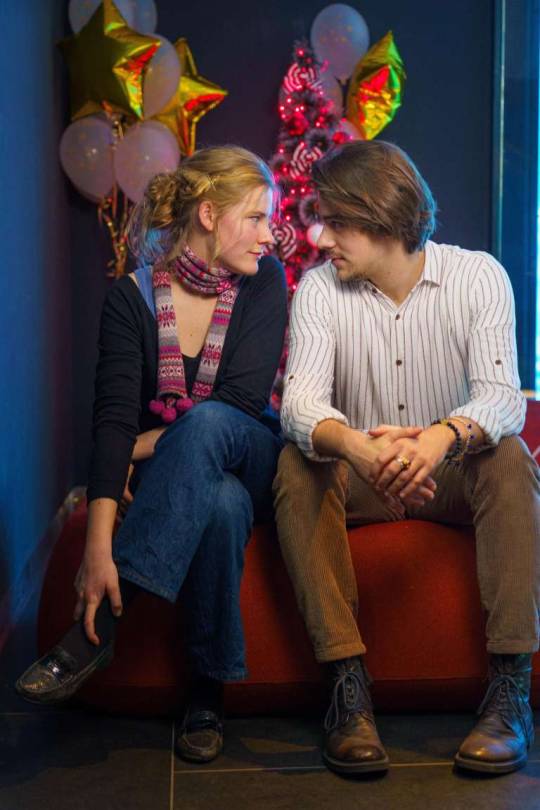
They don't hide that it was a lot of fun on the set: "We had as much fun as we could. It was relaxing." Photo by Šimon Zupančič
In the film, you are exactly as you were in real life - they haven't even changed your hairstyle. How so?
I have a lot of contracts that say I can't change it. (laughs) No, it's a joke! Tosja was pleased with my appearance. The film is interesting because the 15-year-olds are played by 20-year-olds and older.
How much time do you have now that you are a European music star?
To be honest, very little. Three days ago I returned from the last tour of the year. I have a cold, of course, so it would be very convenient if I had a couple of days to lie down, but I have the whole premiere day today and tomorrow, a concert on Saturday, and on Sunday we go back to the studio for a week. Then we've got a few more gigs, then we're moving to London for two months, and then we've got a one-month tour. Then we'll probably go to Germany for a month to record the album, and then we'll have another tour soon...
We won't see you much.
Exactly, because there's too much of me everywhere now. (smiles)
How was it on set?
Bojan: It was great for me because I knew the whole team from before.
How did you and Ester* meet? (*T/N: They probably meant Katja)
Bojan: Through mutual friends, maybe even through Mila...
Katja: Haven't we known each other since primary school? Or from the audition for Vičstock?
Bojan: Yes, indeed! Katja was one of the organisers of Vičstock at Vič high school, and I was in one of the bands that wanted to play at the festival. And we did play at Vičstock. We actually know each other from ninth grade - like our characters in the film.
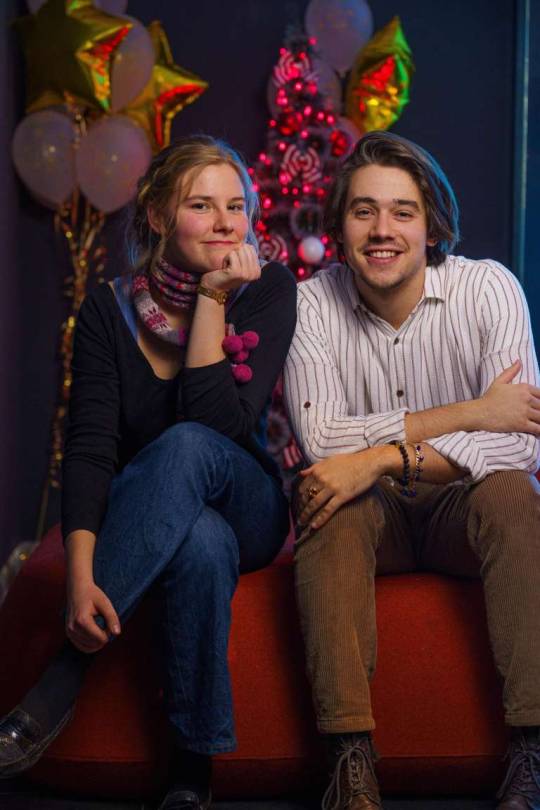
The stars of the new Slovenian teen movie shared with us some interesting facts from the filming of it. (Photo by Šimen Zupančič)
What are you willing to do for love, Bojan? Because your character is very committed in the film to get Ester back.
I have a little wish to find love again, for which I would be willing to do such a big thing. It seems to me that I have not felt that since primary school or the beginning of high school.
Was your first love fatal? Like Kaj's?
Katja: Yes!
Bojan: In my opinion, yes.
And how did your first love end?
Bojan: Ask me if I have a girlfriend.
Do you have one?
Bojan: No. (laughs) I told you that I have been rejected in the past. But I had my first love in kindergarten.
Katja: I remember my first boyfriend from high school. We, of course, had to hide our relationship from everyone, in case we broke up afterwards and embarrassed ourselves. That way nobody knew we were in love and nobody asked anything when it was over.
Have you ever hidden your love?
Bojan: No, I'm like an open book.
Did you have fun during the filming or were you focused the whole time?
Bojan: We had as much fun as we could. It was relaxing.
Katja: I just remember that Diana and I used to rehearse scenes and kiss all the time, thinking that that would keep us in the role...
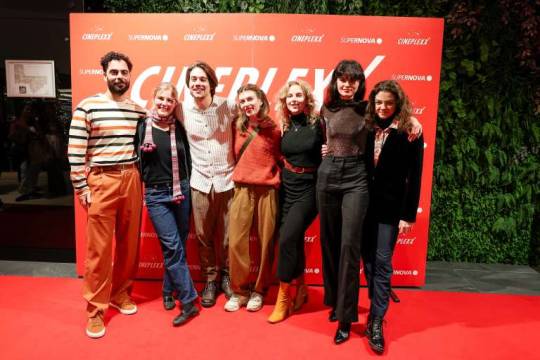
Film director Tosja Flaker Berce with the cast of 'Kaj pa Ester?': Katja Predan, Bojan Cvjetićanin, Mila Peršin, Suzana Krevh, Veronika Železnik, and Diana Kolenc. (Photo by Mediaspeed)
Have you also been kissing a lot?
Bojan: All the time, but only when the camera was on (laughs).
What did you think of the script?
Katja: For me, the biggest question was why they went their separate ways in the first place, but looking back, I understand Ester more and more.
Bojan: (playing offended) What are you trying to say?
Katja: (laughs) Yeah, he was probably too fixated on her.
What are the differences between you and your characters?
Bojan: The biggest difference is that as a young boy, I was not a loner like Kaj over the years. Kaj wanted to spend time with Ester more than anything, and I see the key problem with their relationship as the fact that it started to suffocate Ester. Ester, in my opinion, wanted to get away from this one-to-one, one-person, all-day contact. Of course, we're young in the film and you have doubts about your first real romantic relationship, but it started to suffocate Ester...
Katja: ...that there is nothing else.
Bojan: Anyway - Ester is not cool, neither is Kaj. She sits at home and plays 'Krofki'² ('Doughnuts').
What do you do in your free time now?
Katja: I like to read and I'm quite similar to Ester in terms of my nerdiness.
Bojan: I like reading too. If I have time during the day to do something, I like to relax as actively as possible, ride a horse or go-kart, fish... In short, something to get the energy out of me. I'm not good at fishing at all, but it calms me down a lot.
Do you like being so busy, travelling so much?
I wouldn't say I have a big problem with the workload. But it is very tiring to travel a lot. Some of the tours have been designed so that we travel by tour bus, which means that I can sleep in a bed in the bus all night between locations and at least be rested the next day.
But is it good quality sleep?
For me, it is the best in the world and I am thinking about how to recreate this rocking coffin at home. Very small and tight, but the best. But if the connections on the tour are by plane, like we had now, for example, when we flew ten times in seven days, it means you only get about four hours sleep a day. And that exhausts you.
What about packing each time?
I've already got it all worked out! Now I don't even take things out of suitcases, I take the shirt from the top and put the dirty things in a bag somewhere at the bottom. I have two big suitcases at home to change.
¹The Academy of Theatre, Radio, Film and Television (Akademija za Gledališče, Radio, Film in Televizijo) is the only higher education institution in Slovenia that trains at university level for professions in theatre, film, radio and television.
²The game 'Krofki' is a made up videogame, played by characters in the movie.
63 notes
·
View notes
Text
"Success is becoming almost a biological notion, and thus the foundation of a genuine racism of successfulness. The poorest and the most miserable are no longer perceived as a socioeconomic class, but almost as a race of their own, as a special form of life. "
Zupančič
17 notes
·
View notes
Text
Prof. Dr. Boštjan M. Zupančič is a former Judge and President of the Third Chamber at the European Court of Human Rights. His tenure as a judge in Strasbourg spanned nearly 18 years, from November 1998 to May 2016. According to his professional profile on LinkedIn, he is currently a self-employed legal consultant.
Prof. Dr. Boštjan M. Zupančič is also a raging antisemite who shares far-right, Neo Nazi and white supremacist material on social media.



16 notes
·
View notes
Text

Slovénie. Tanja Brkić : « Le wokisme se cache derrière un masque “bienveillant” mais représente le mal. Un mal qui doit être détruit » [Interview]
Tanja Brkić est journaliste à la chaîne Nova24tv, titulaire d’un master en organisation des ressources humaines et forte de plusieurs années d’expérience dans diverses professions, principalement dans les médias. D’après ses interventions dans différents médias, elle est la voix la plus combative contre l’agenda woke en Slovénie.
Notre confrère Álvaro Peñas (deliberatio.eu) l’a interrogée.
En Espagne, le parti d’extrême gauche Podemos a fait adopter une loi controversée sur les transgenres, ainsi que des lois radicales sur le féminisme et les droits des animaux. En Slovénie, un parti très similaire, Levica (La Gauche), est au gouvernement : Levica est-il la force motrice du wokisme en Slovénie ?
Tanja Brkić : Lorsque je regarde la situation actuelle de l’espace politique en Slovénie, je peux affirmer que le marxisme culturel n’est pas un simple mythe. Même s’il n’est pas évident pour le profane que la gauche est derrière tout cela, il y a des faits qui montrent clairement la responsabilité de la gauche et des activistes de gauche dans l’effondrement du système. Il est difficile de blâmer un seul parti, alors que pratiquement tous les partis de gauche naviguent dans la même direction, et en outre, les ONG ont beaucoup de pouvoir en Slovénie. Il leur est donc facile de tromper le citoyen moyen qui suit objectivement la vie sociale et politique du pays, car les grandes décisions ne viennent pas forcément des partis politiques en eux mêmes.
L’indépendance des ONG est discutable lorsqu’elles sont principalement dirigées par des activistes de gauche.
Tanja Brkić : Oui, c’est le cas. Prenons par exemple l’une des organisations les plus en vue, l’Institut du 8 mars. Il s’agit d’une équipe de jeunes gens qui a jusqu’à présent activement promu les idées des partis de gauche et leurs intérêts, mais peu de gens savent que le fondateur de cette organisation non gouvernementale est un membre du parti Levica, Simon Maljevac, qui est également ministre de l’Avenir solidaire (ministère nouvellement créé).
Il est également l’éditeur de la publication Legebitra, qui est un matériel LGBTQ visible destiné à l’endoctrinement des jeunes. L’actuel directeur de l’Institut est un ancien membre de la gauche, mais aujourd’hui un ardent activiste, Nika Kovač, qui a activement participé avec la communauté LGBTQ à la campagne pour l’adoption d’un nouveau code de la famille qui détruit la famille traditionnelle (Les amendements au code de la famille, selon lesquels le mariage est une union de vie de deux personnes et qui permettent également à un couple de même sexe d’adopter un enfant, sont entrés en vigueur en janvier 2023).
Nika Kovač ne nie pas qu’elle est également financée par l’étranger. L’Institut du 8 mars n’est pas le seul, car il est connu que les organisations non gouvernementales slovènes de gauche sont financées par diverses fondations étrangères, qui sont également les principaux financiers des groupes de gauche dans les différents pays. Par exemple, le président de l’Assemblée nationale, Urška Klakočar Zupančič, a reçu une bourse de l’Open Society de George Soros. Pour en revenir à Kovač, et en laissant de côté le fait qu’elle est née avec une cuillère en or dans la bouche et qu’elle fait partie de l’élite privilégiée, elle a été l’une des boursières du programme de Barack Obama et est également devenue récemment la chef du conseil stratégique pour la poursuite des discours de haine, où elle a présenté des recommandations au gouvernement, qui sont pratiquement des instructions pour la censure et une demande de financement systémique.
C’est exactement ce que je dénonce depuis longtemps qui se produit sous le gouvernement actuel.
Le gouvernement slovène, dont le principal partenaire est le Mouvement pour la liberté de Robert Golob, un libéral, est donc totalement dévoué aux politiques de la gauche.
Tanja Brkić : Oui, depuis l’arrivée au pouvoir du nouveau gouvernement, il est clair que l’accord de coalition est en fait un accord soumis à l’application du programme du parti Levica. Le gouvernement Golob est composé exactement de partis favorables au wokisme, qui sont unis en termes d’idéologie du genre et de changement climatique. Dans l’ensemble, il semble que le premier ministre ne soit qu’une marionnette qui n’apparaît devant les médias que lorsqu’il a besoin d’être félicité, alors qu’il ne répond pas souvent aux critiques, presque jamais, et que lorsqu’il le fait, il fait des promesses qu’il ne tient pas. Par ailleurs, les activistes de gauche ont été la principale raison pour laquelle le premier ministre est arrivé au pouvoir en premier lieu, alors maintenant il leur fait un clin d’œil dans tout, ce qui est prouvé par le fait que les représentants des ONG écrivent des lois pour lui, qui sont ensuite adoptées. Nous l’avons vu dans le cas de l’amendement à la loi sur la télévision publique, lorsqu’il s’est avéré que le projet de loi avait été rédigé par une ONG, et c’est maintenant également le cas dans le cadre de la poursuite des discours de haine, où le représentant d’une ONG a de nouveau le dernier mot.
Ce que font la gauche et ses membres est pervers, et j’irai même plus loin, diabolique selon la définition qu’en fait l’archevêque Fulton J. Sheen, qui a expliqué qu’il y a trois signes particulièrement « diaboliques » et qu’ils sont tous présents dans le fonctionnement de la gauche. Le premier est l’obsession pour la nudité, dans le sens où la gauche, sous le nouveau gouvernement, veut “sexualiser la société”, en particulier avec ces idées confuses sur une idéologie de genre fictive qui ne fait qu’embrouiller les enfants. La deuxième chose est la violence, notamment dans le sens de rejeter la responsabilité sur les autres, comme ils l’ont fait sous le gouvernement de Janez Janša en le rendant responsable de tout, et la troisième chose est la division parce qu’ils veulent diviser les enfants dès leur plus jeune âge en utilisant le genre. Les écoles deviennent un laboratoire social de gauche, où les enfants sont endoctrinés moralement, et Nika Kovač est un exemple pour les jeunes d’aujourd’hui.
Vous avez évoqué le changement climatique, quelle est la position du gouvernement slovène ?
Tanja Brkić : Tous les partis de la coalition sont d’accord sur le changement climatique et la crise climatique. Levica préférerait que les gens abandonnent les transports et roulent à vélo, mais dans le même temps, nous assistons à une centralisation autoritaire, tandis que les habitants des villes environnantes et d’autres régions sont ignorés. Il y a quelque temps, le Premier ministre a parlé de limiter la quantité de viande, comme en Allemagne, en disant que c’était pour le bien de la nature, mais d’un autre côté, il est l’ami du maire de Ljubljana, qui est littéralement en train de construire un réseau d’égouts à travers le captage d’eau potable. Il convient de noter que ni le premier ministre ni le ministre chargé de l’environnement ne condamnent cette situation. Au contraire, ils y participent tous et s’excusent de ne rien pouvoir faire.
Quel est le rôle de l’Eglise slovène face à cette offensive des Woke ?
Tanja Brkić : L’Église est opposée aux idées du wokisme, mais, à mon avis, sa voix est absolument sous-estimée. Je pense qu’elle aurait dû se faire entendre le plus fort au moment de la modification du code de la famille, car la famille n’est rien d’autre que l’institution fondamentale de la société, qui a été établie par Dieu.
Pensez-vous que les Slovènes sont conscients de ce que signifie l’idéologie du genre ?
Tanja Brkić : Non, je pense honnêtement qu’en Slovénie, ils ne sont pas conscients de ce que cela signifie exactement et des conséquences de cette idéologie néfaste. À mon avis, la plupart des gens ne s’en préoccupent même pas ou l’ignorent tout simplement en pensant que “ce n’est pas leur affaire”. Comme pour toutes les autres questions sociopolitiques. Nous devons être conscients que la Slovénie compte une large population de personnes âgées qui ont une identité solidement construite, alors que les jeunes sont de plus en plus soumis à l’idéologie de la guerre, la contagion sociale à travers les réseaux sociaux étant la principale raison de ce phénomène. Le plus triste, c’est que tout cela – à la fois le wokisme et le marxisme culturel – se déroule sous nos yeux et que les conséquences seront dévastatrices pour les générations futures dont l’identité, en tant que nation, est également menacée.
Je pense que beaucoup de choses ont changé au cours de l’année écoulée, depuis l’arrivée au pouvoir du nouveau gouvernement. Dans le mauvais sens du terme. Les idéologies LGBTQ sont imposées, les ministres accrochent des drapeaux arc-en-ciel devant les ministères (ce qui, à la base, ne représente pas l’égalité et l’inclusion, mais un programme politique), les médias dissidents sont persécutés, les migrants sont accueillis en grand nombre et les citoyens sont oubliés. Ils affirment que “l’acceptation, l’inclusion et l’égalité” constituent un progrès, même progressif, mais il s’agit d’un retard total. Comme je l’ai dit, leur objectif est de dévaloriser la société, l’homme et son humanité. La destruction des fondements tels que la religion, la famille, le patriotisme et, en fin de compte, l’État légal et démocratique. Que reste-t-il à l’homme lorsqu’il perd son identité, sa conscience, sa personnalité, l’importance des valeurs fondamentales et la possibilité de discuter ? Il devient un numéro, une personne, un moins que rien, pour qui seule son existence suffit parce qu’elle représente le potentiel d’exploitation de quelques privilégiés.
Il y a quelques mois, le journaliste Joze Biscak a été pointé du doigt et condamné pour avoir publié un article satirique sur l’immigration clandestine. La cancel culture est-elle répandue en Slovénie ?
Tanja Brkić : La cancel culture est devenue une réalité en Slovénie également, même si elle n’est pas encore aussi prononcée, mais elle se développe. Ce qui n’est pas surprenant, puisque nous nous demandons depuis peu si Twitter sera autorisé en Europe, depuis qu’Elon Musk a décidé de ne pas suivre leur directive ou leur censure. Et compte tenu du fait bien connu que les mondialistes de gauche influencent la majorité du Parlement européen, qui à son tour influence les décisions de tous les autres gouvernements de l’Union européenne, ce n’est qu’une question de temps avant que cette influence ne se fasse sentir encore plus fortement dans notre pays. Permettez-moi de vous rappeler que les gauchistes slovènes ont reçu le soutien total (bien qu’officieux mais évident) de la vice-présidente européenne Vera Jourova lorsque la gauche slovène a tenté de prendre le contrôle de la télévision publique. Il s’agit d’un sujet extrêmement vaste et discutable, mais le wokisme se cache derrière un masque “bienveillant” mais représente le mal. Un mal qui doit être détruit.
12 notes
·
View notes
Text
Jurij Tepeš is going to replace Zoran Zupančič??
6 notes
·
View notes
Text
“The point of Lacan's identification of the Real with the impossible is not that the Real is some Thing that cannot possibly happen—the whole point of the Lacanian concept of the Real is that the impossible happens.”
Alenka Zupančič, The Odd One In: On Comedy
48 notes
·
View notes
Text

FREEDOM UNDER ATTACK? Ex-boxer MP Dejan Zavec (Svoboda) and Assembly SpeakHER Urška Klakočar Zupančič (Svoboda), in an apparent fight in the Assembly. The cause of the incident is still being investigated...
#apparently they filmed a video for a campaign for the *fight* against children's cancer#but this pic is fucking hilarious#slovenia
8 notes
·
View notes
Text
Dimitrij Rupel: BU- IN KLAKO-ČAR
Dimitrij Rupel: BU- IN KLAKO-ČAR
Avtomobil ali falcon?
Dr. France Bučar je pred 34 leti, januarja 1988, s svojim (zasebnim) avtomobilom odpotoval v Strasbourg, kjer je na povabilo Otta von Habsburga nastopil pred “skupino za Vzhodno in Srednjo Evropo” Evropskega parlamenta. Evropske politike je opozoril, da s podporo jugoslovanskim komunističnim oblastem spadajo na napačno stran zgodovine. Bučar je bil partizan, univerzitetni…

View On WordPress
0 notes
Text
Slovenian philosopher Alenka Zupančič has dubbed this biomorality – people must take care of their bodies because not doing so means they are stupid or irresponsible. It is a moral judgment – healthy people concerned about their bodies are good people, and unhealthy people are bad people.
Such a mentality explains why people view those who are obese as lazy or not trying hard enough, if at all, to improve their health. In doing so, obese people are evading their moral and social responsibilities. Similarly, smoking has become another way to judge a person’s social morality. Smokers are thought of as more “stupid” and “selfish” than people who don’t smoke.
The crucial point is that biomorality has led us to focus all our attention on the physical body, socially shaming people into following a wellness lifestyle and in doing so, keeping them occupied with diets and fads as to not question the moral assumptions of such obsessions.
1 note
·
View note
Text
A Laplanchian “Engine”?
Alenka Zupančič, in Why Psychoanalysis?, lists “three elements” (pg. 40) in dealing with the thought of Jean Laplanche and the “cause” of the unconscious:
[For Hegel, the syllogistic “Individual”:] A specific, subjective figure related to the formations of the unconscious. “…in inner intuition, even the thinking subject is an appearance to himself.” –Immanuel Kant, Preface to Critique of Practical Reason. (real lack)
Plus, two “kinds of causes”:
[For Hegel, the syllogistic “Universal”:] Elements, words, gestures, gazes, etc. that constitute what Jean Laplanche called “enigmatic messages” circulating in the Other. (symbolic lack)
[For Hegel, the syllogistic “Particular”:] The objective or object-like surplus/leftover of the interpretation of these messages. (imaginary lack)
Furthermore: Jacques Lacan states in his seminar, Desire and Its Interpretation: “Thus, desire is neither the appetite for satisfaction, nor the demand for love, but the difference that results from the subtraction of the first, from the second, the phenomenon of their splitting (Spaltung).”
(A quote I found here: https://nosubject.com/Desire)
Therefore:
Demand for love – appetite for satisfaction = desire
Privation, linked perceptually to frustration, is the production of symbolic lack. But prior to this linkage, the semblance of real lack must be apprehended in a form of imaginary object that is structured like a knowledge. The predicate of this knowledge is presumably the symbolic order, but it is ascertained in the form of an “enigma”, which coincides with Kantian speculative reason, or, that idea of skepticism as it pertains to the thing-in-itself. The overall effect of this knowledge is fundamentally repressive, as it locks in place for appearance the semblance of a noun. But the accession to Kantian pure practical reason is capitulated simultaneously, and the valence of cognition towards appearance, through both its noun-semblance and through pure practical reason is what determines for the subject how the (syllogistic) Universal will tend to be treated in the form of knowledge.
In unison with the desire of the Other, then, there emerges (in the subject) the feminine construct of the idea of gender, along with the ambiguous construct of the moral law.
Or at least, so long as the (syllogistic) Individual is anchored in place by real lack in the specific, subjective figure of the formations of the unconscious, we have an analogy to Hegel’s qualitative syllogism, from which such interactions with the desire of the Other may proceed. If there is any such thing as a psychoanalytic “end of history”, then this figuration is the psychical groundwork of the object a itself.
Altogether, this forms a figurative “engine” of the historical progression and development of human knowledge. This inculcates science, history, and thought itself, all in conversation with the collective anchoring points of the pursuit of truth in discourse that make up a formal unconscious which corresponds to the Other as something universally shared.
Yet, Laplanche (according to Zupančič) seems to introduce (what I would consider as) a kind of (perhaps Marxian) materialism to the Lacanian unconscious and its relation to knowledge. This is because the Other of the child is also necessarily the same Other of the child’s parents, which only ever culminated for those parents in an incomplete knowledge which is characterized by its relationship to “enigmatic messages”, without any clear solutions to their meaning, nor any closure towards the historical progress the parents' generation bore to its successors.
However, this factor of materialism is in actuality just the (repressive) constant which determines the basic character of “primal repression” itself. Laplanche in this account, without Alenka Zupančič necessarily saying so, apparently criticizes Lacan for making the agents of the moments of the Oedipus complex (real father, symbolic mother, imaginary father) into perceptually metaphysical and overly-abstract figures (by means of the Lacanian interpretation of Freud’s concept of child “seduction”), which are thereby impotent to explain the knowledge-Other of reality, which is to say, the incongruousness of the whole multiplicity of billions of other Others, presumably now serving for every single different person who is currently alive.
But, as Alenka Zupančič writes:

(Pg. 41).
Also:
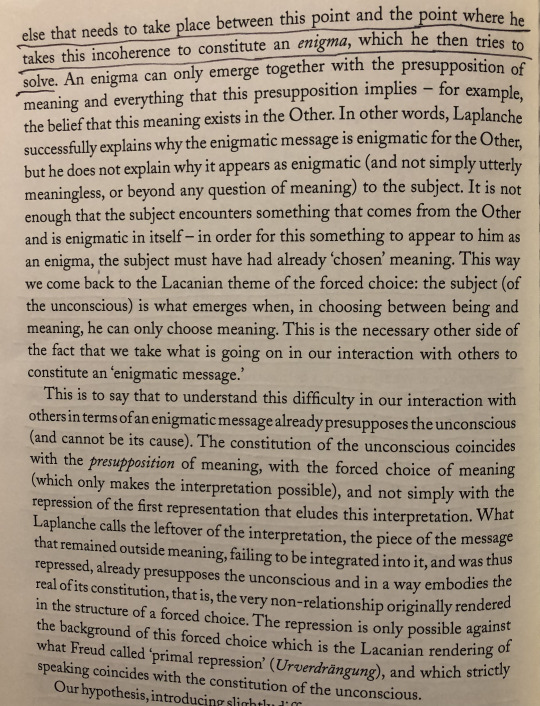
Perhaps then the question in any self-analysis is not to wonder “when did my parents or caregivers first touch me in an erotic way that I had to repress in order to understand who they truly were?”, but rather, “when did the physical world (or entire universe) first touch me in an erotic way that I had to repress in order to understand what it truly was (in relation to myself)?”
In reality, however, it is crucial to ask both questions anyway, and I think Alenka Zupančič might agree and have a lot more to say about it.
This dualism of the two questions is also how the hypothetical Laplanchian “engine” I would like to propose is analytically constructed. Is the Other really necessarily always the Other of one’s parents or culture, or is it more like the Other of the physical/material universe itself? In any case, it functions mostly like an engine of history, or of scientific discovery, just to simplify the ideas of knowledge concerned here.
— (10/15/2022)
4 notes
·
View notes
